We are living in a time when some buildings, monuments and places are having their names changed. They are structures and places named in another era for the notable persons of their time. They were generally highly respected individuals. However, looking back, with the benefit of better understandings and greater sensitivity, they no longer look quite so heroic. Some held decidedly offensive views, though in their time, they were commonplace. One such individual was Hubert Howe Bancroft. His name adorns one of America's most respected libraries, the University of California at Berkeley's Bancroft Library. Some people want that name changed.
Hubert Howe Bancroft was a book publisher. He came from Ohio to California in the early 1850s and within a decade, was the largest publisher in the West. He evidently did quite well financially as he retired in his prime and began writing and collecting books. He took on a major project – a history of the American West. It encompasses 39 volumes, took many years and writers to complete, and even today is considered an essential source for information about the West in its youth. It was not notably scholarly by today's standards, with opinion mixed in with facts, but the amount of information is remarkable for its time. Bancroft did receive some criticism back then, though not for objectivity and sensitivity. It was for failing to give the writers who assisted him in the venture their due credit.
In time, Bancroft's personal collection grew and grew. By the time he concluded it should be sold, it contained something in the area of 60,000 volumes. He put them up for sale at a price of $250,000. There were no takers. The state of California turned him down. Over several years it languished. Eventually, he got an appraisal for $300,000. Finally, he offered it to the state again, still for the $250,000 price, but Bancroft made the choice easier this time. He contributed $100,000 of his own money toward the purchase. In return, he expected the library housing it would bear the Bancroft name. California accepted.
I have not read Bancroft's 39 volumes (nor any of them) so I cannot make statements from personal knowledge, but apparently there are sections in there that are quite racist. In describing his collection, the Bancroft Library website says, “NOTE: The Library acknowledges the controversial legacy of Hubert Howe Bancroft whose writings and published works exhibit damaging and racist views, particularly against Indigenous, Asian, and African American communities. This section is not intended to glorify the man, but rather highlight the historical value and importance of the collection he amassed.”
Bancroft evidently held what was a common point of view at the time by White, European descended males – White, European males were racially, sexually, and ethnically superior to persons not sharing those attributes. A comment from Bancroft in one of his volumes, quoted in Smithsonian Magazine, says, “Several women were also employed upon these voyages [writing the texts]. I know not why it is, but almost every attempt to employ female talent in connection with these industries has proved a signal failure. I have today nothing to show for thousands of dollars paid out for the futile attempts of female writers…If she have genius, let her stay at home, write from her effervescent brain, and sell the product to the highest bidder.” To say that is sexist would be the understatement of 2024, but obviously Bancroft could not see it. It's hard to understand why he could not, but Bancroft lived in different times, when others were equally obtuse.
It's worth pointing out here that even Lincoln said Blacks were not equal in “all respects,” though equal in the right to life, liberty, and the pursuit of happiness. That was exceptional then, but today it wouldn't fly. Ashley A. Bancroft, Hubert Howe's father, was an early leader in the abolitionist movement in Ohio. His house was a stop on the Underground Railroad, and Hubert may have assisted in moving escaped slaves north hidden in a hay wagon. It is hard to imagine he was not in favor of abolition and rights for Black people like Lincoln. It was not inconsistent at that time to be a strong defender of black freedom while still having disdain for the people themselves. It sounds like Hubert Bancroft may have fit that model.
A couple of years ago, a student became aware of Bancroft's past statements and petitioned the university to change the library's name. A group was formed to consider the request called the Bancroft Library Reckoning Committee. Several public hearings were scheduled which by this time should have already taken place. These cases can be hard to decide. Bancroft was a generous if bigoted man. His gift made the library possible. I don't know how bad his level of insensitivity was, but my own feelings are that if his sentiments were typical of his time, his generosity should not be eradicated from history. I believe their views would be like ours if they were born today. Washington owned slaves, but I am certain he wouldn't want to own slaves if he were alive today. We have the benefit of hindsight; they don't. On the other hand, if he was offensive even for that era, he probably would be the same today and his name should go.
Berkeley, the city and university, are named after Bishop George Berkeley, who owned slaves and called Indians “savages.” He advocated kidnapping Indian children to convert them to Christianity. We would not be naming our cities and colleges for him today, but this was almost 300 years ago and it is especially hard to rename a city or university all these years later. Think of all the places named after Christopher Columbus, yet he was a terrible person even by the standards of his time. His fellow slave owners thought him brutal.
In writing about the West, Bancroft interviewed John Evans. Like Bancroft, Evans came west from Ohio. He became Governor of Colorado, and did many good things, including being a founder of Northwestern University and the University of Denver. On the other hand, Evans ordered the local militia to go out and kill as many Indians as they could find. The Sand Creek Massacre is also part of his legacy. Evans told Bancroft that he converted from Quakerism to Methodism so he could kill Indians (no, Methodists don't advocate killing Indians but they aren't total pacifists like Quakers). Mt. Evans, whose peak is reached via the highest paved road in America, was named for Gov. Evans. It isn't any more. It is now Mt. Blue Sky, as it was originally known to native tribes. Bancroft wasn't Evans, but not Martin Luther King either. He is one of those many people somewhere in between, and each community will have to decide for itself how to handle places named for them.


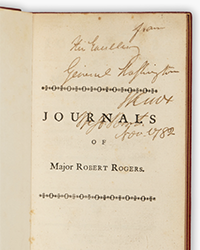
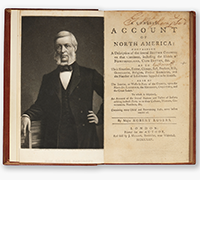
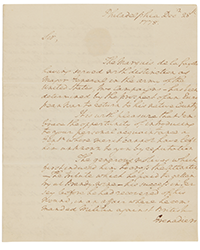
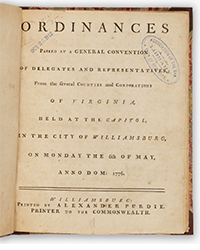
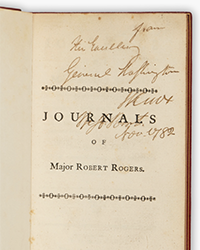

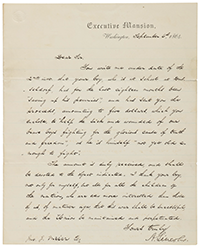
![<b>Sotheby’s, Jan. 27:</b> [World War II]. An archive of maps and files documenting the allied campaign in Europe, from the early stages of planning for D-Day and Operation Overlord, to Germany’s surrender. $200,000 to $300,000. <b>Sotheby’s, Jan. 27:</b> [World War II]. An archive of maps and files documenting the allied campaign in Europe, from the early stages of planning for D-Day and Operation Overlord, to Germany’s surrender. $200,000 to $300,000.](https://ae-files.s3.amazonaws.com/AdvertisementPhotos/9d2762bc-9f26-47ef-96de-1c28070e19f6.png)
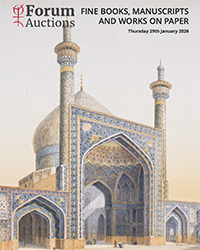
![<b>Forum, Jan. 29:</b> Plato. [<i>Apanta ta tou Platonos. Omnia Platonis opera</i>], 2 parts in 2 vol., editio princeps of Plato's works in the original Greek, Venice, House of Aldus, 1513. £8,000-12,000 <b>Forum, Jan. 29:</b> Plato. [<i>Apanta ta tou Platonos. Omnia Platonis opera</i>], 2 parts in 2 vol., editio princeps of Plato's works in the original Greek, Venice, House of Aldus, 1513. £8,000-12,000](https://ae-files.s3.amazonaws.com/AdvertisementPhotos/df7dd9ac-f0d0-4cb3-a44d-2731758530e4.png)
![<b>Forum, Jan. 29:</b> Book of Hours, Use of Rome, In Latin, illuminated manuscript on vellum, [Southern Netherlands (probably Bruges), c.1460]. £6,000-8,000 <b>Forum, Jan. 29:</b> Book of Hours, Use of Rome, In Latin, illuminated manuscript on vellum, [Southern Netherlands (probably Bruges), c.1460]. £6,000-8,000](https://ae-files.s3.amazonaws.com/AdvertisementPhotos/c40bad29-8cb5-4347-a0fd-5361d39e84a5.png)
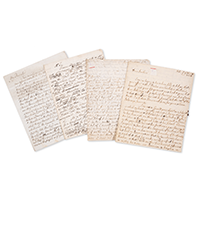
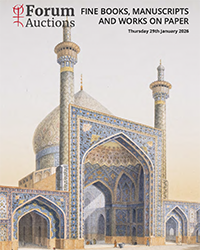
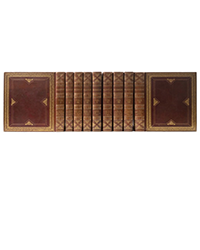
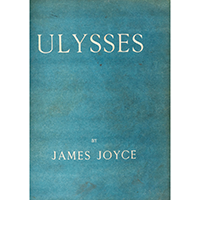
![<b>Forum, Jan. 29:</b> Powell (Anthony). [<i>A Dance to the Music of Time</i>], 12 vol., first editions, each with a signed presentation inscription from the author to Osbert Lancaster, 1951-75. £6,000-8,000 <b>Forum, Jan. 29:</b> Powell (Anthony). [<i>A Dance to the Music of Time</i>], 12 vol., first editions, each with a signed presentation inscription from the author to Osbert Lancaster, 1951-75. £6,000-8,000](https://ae-files.s3.amazonaws.com/AdvertisementPhotos/b7fdee12-4803-4d32-9330-a5729091cb92.png)
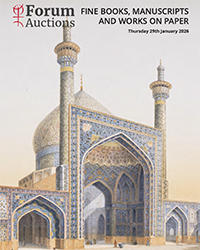
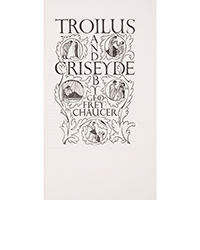
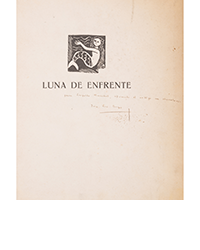
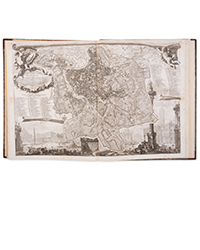
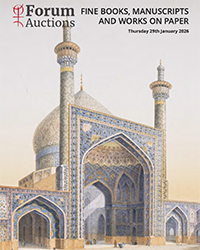
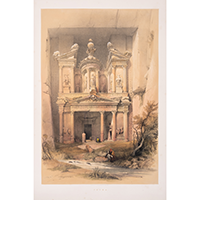
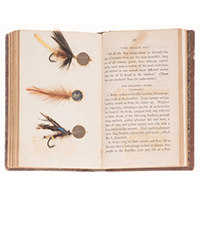
![<b>Forum, Jan. 29:</b> Herschel (Sir John F. W.) Collection of 69 offprints, extracts and separate publications by Herschel, bound for his son, William James Herschel, 3 vol., [1813-50]. £15,000-20,000 <b>Forum, Jan. 29:</b> Herschel (Sir John F. W.) Collection of 69 offprints, extracts and separate publications by Herschel, bound for his son, William James Herschel, 3 vol., [1813-50]. £15,000-20,000](https://ae-files.s3.amazonaws.com/AdvertisementPhotos/a06cc0dd-7619-45e9-b155-5ad75ed7b2e5.png)